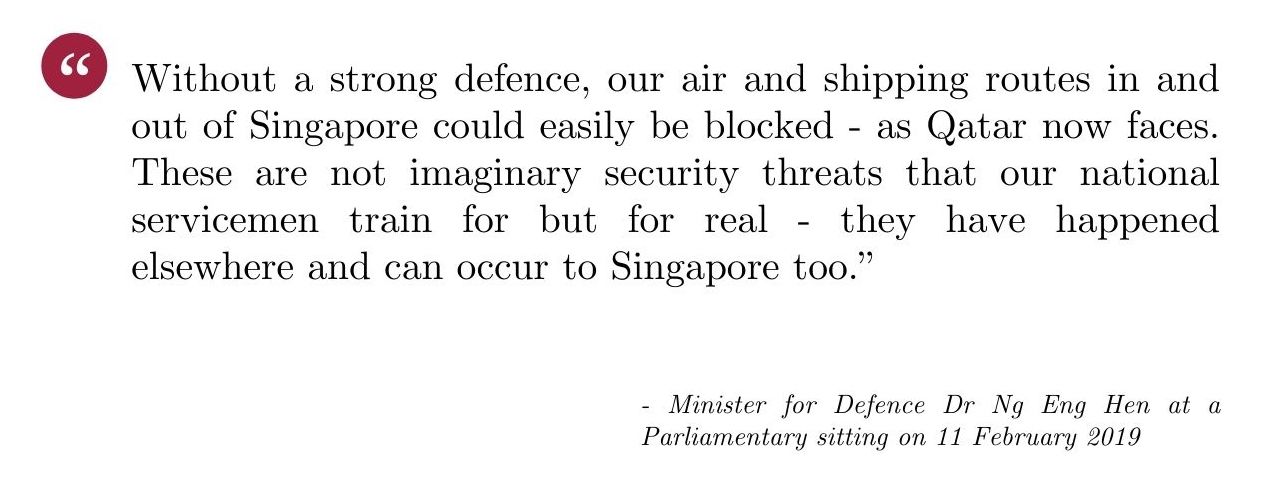Global Incidents
Global Incidents

Singapore only has to take a look at recent events to see how other countries, especially small states, can have their interests subjugated.
For example, Singapore and Qatar, a state on the west coast of the Persian Gulf, share a few things in common. Both have overcome their limited land size to become globally recognised as trade hubs, despite regional pressure.
On 5 June 2017, Saudi Arabia, the United Arab Emirates, Bahrain and Egypt unexpectedly severed diplomatic relations with Qatar, over its alleged support for terrorism, and close ties with their geopolitical rival Iran. The embargo cut off major regional trade routes to Qatar for 43 months, and the country had to rapidly restructure trade routes and create new supply chains.
The matter was discussed in Singapore’s Parliament, with Minister for Defence Dr Ng Eng Hen bringing up the point that without a strong defence, the same could happen to Singapore – a group of countries could band together to coerce us into bowing to their interests.
The first lesson learnt is that one can never take our sovereignty for granted. Historically and around the world, there have been other acts of aggression made against smaller countries. In 1990, Kuwait was invaded by Iraq and did not have adequate military strength to defend itself. The US and other allies had to push Iraqi forces out, and Singapore contributed to Kuwait’s post-conflict stabilisation. When the Cold War ended and the Soviet Union collapsed, Lithuania and other Baltic states thought it was time to reap the “peace dividend” and abolished their military conscription. Two decades later, Russia’s annexation of Crimea prompted Lithuania to re-start military conscription in 2015.
On 24 February 2022, Russian President Vladimir Putin authorised a “special military operation” against Ukraine, a former Soviet Union territory that Russia views as within its sphere of influence even after its independence in 1991. The tensions in Ukraine demonstrate the need for every nation to have the ability to defend itself against external aggression, which can take on many forms other than military confrontation, such as hybrid attacks where kinetic and non-kinetic tools like disinformation or cyber-attacks may be used. This is why Singapore has our own military defence, the SAF, built upon National Service, as one of the cornerstones of our defence strategy. This allows Singapore to act on our national priorities while deterring other countries from aggressive acts against us.
It also takes a Whole-of Society response, in the form of Total Defence, to effectively protect the country against a variety of evolving security threats. Total Defence involves every Singaporean playing their part, both individually and collectively. For instance, if and when Singapore faces external economic or diplomatic pressures, such as supply chain difficulties arising from external or diplomatic pressures or the COVID-19 pandemic, we will need to remain cohesive and united to overcome the crises with collective determination.
The second lesson learnt is that we need a steady and consistent approach towards investing in our military capabilities, while looking ahead and ensuring we build up a future-ready defence force that protects Singapore against a wide spectrum of threats today and tomorrow. Various global events have demonstrated that physical and virtual security are intricately interwoven, as threats in the digital domain can readily impact events in the physical world. While there has been no evidence of orchestrated attempts to subvert or subjugate Singapore using hybrid means, this does not mean that the threat will never come.
To meet emerging and growing threats in the digital domain, the SAF will set up a fourth service – the Digital and Intelligence Service (DIS). It will provide accurate, relevant and timely warning and enhanced intelligence, as well as advanced connectivity for the SAF. The addition of DIS will allow the SAF to better train and fight as a networked, integrated and expanded force to not only deal with the spectrum of threats that exist today, but also prepare for those that will appear in the future.

